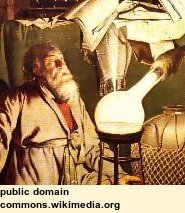
Home... Help... Search... MyGod...
God Uses Us Despite Our Failings (Numbers 11:25-35)
Who of us has not thought at some time, and often, that perhaps He cannot, or will not, make any use of us because of what we see as our failures? "I'm useless - I might as well give up...". Well, I hope to show you that you are not any worse (or better) than just about all the heroes in the Bible, and that we beat ourselves up far too much. Yes, failure is failure, but God is greater!
all imperfections stem from the FALL; some stain of it is in all our daily failings; eg, my bad memory is no doubt due in part to the decay of all mankind, but there is probably a bit of laziness in there too.
we are called to obedience and loving service
His mercy & sovereignty; the Divine Alchemist, Who turns the lead of our failures to the gold and silver of His grace (and our reward); He chooses to use the lead of our failings to produce the finest of gold - that was what the old alchemists were trying to do in their search for the philosopher's stone, but they were doomed to failure. Only God can do it (and no, I am not recommending alchemy or any other hocus-pocus, nor suggesting that God is a magician in any such sense - just an illustration of how much He surpasses even the dreams of men).

In the first part of Numbers chapter 11, "God rescues us, even from the pit of despair".

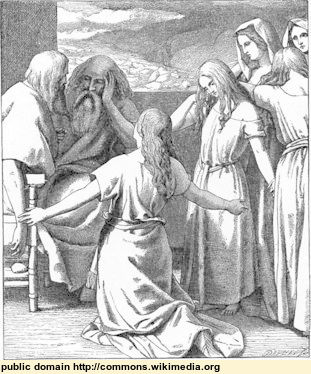
God lifts him up (God knows the pit, gives godly helpers, shows His power)

God sends His Spirit upon them, to equip and honour them before the people
they stay in the camp, yet also receive the Spirit and prophesy the word of God
of Eldad & Medad's 1) failure to come 2) prophesying anyway where they were

"Oh, that all the LORD's people were prophets and that the LORD would put His spirit upon them!" v29
that same day quail by the millions fall around the camp
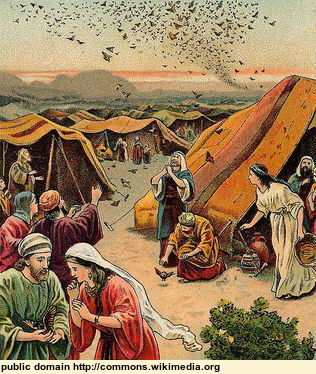
while they eat what they had lusted after, despising what God had given already.
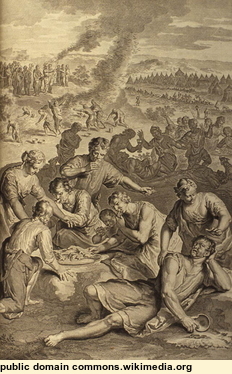
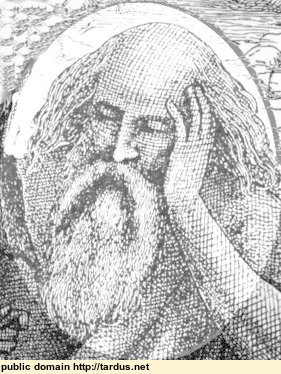
but is restored and serves God 40 years
(perhaps unwilling to share the load with Moses) but God commissions them anyway
with many blind-spots, & needs many lessons from God, but will also serve God and the people many years.
Trucks have them,

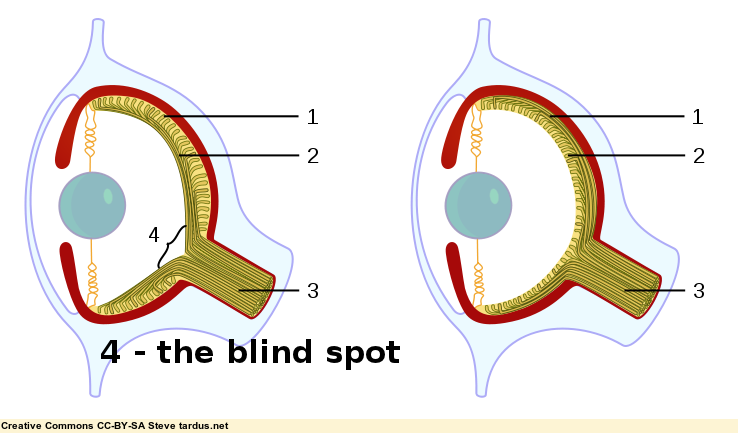
so as to balance his judgement of others' failings (he saw Eldad & Medad's well enough)
despite their failure to come out
harsh, hasty, one-eyed, tainted with pride & self "Moses my lord"

my party, my team, my church, etc. is right! my position, my opinion, my reputation!
but often lacks wisdom, balance and especially humility - summed up as a lack of self-knowledge (pride, weakness, depravity); but their heavenly Master will teach them bit by bit.
The "Sons of Thunder" (so named by Jesus, Mark 3:17) James & John - Lk 9:49-56A

disputing over who would be greatest in Christ's kingdom - v46-48
from rescuing a poor demon-possessed person; why? because "he does not follow with us." v49; He's not one of us! He's not doing things our way!
"for he who is not against us is on our side." v50; John, you've got it wrong
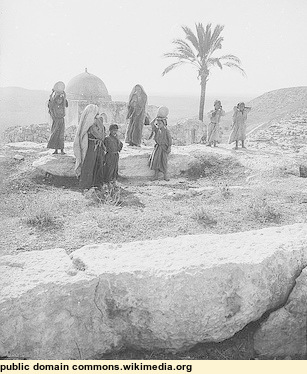
James & John want to command fire from heaven to burn them up. 'Wrong James, wrong John!' - "You do not know what manner of spirit you are of." Out of step with the Holy Spirit; "For the Son of Man did not come to destroy men's lives, but to save them." v56
(but knowledge without zeal is also a disgrace)
("In necessary things unity, in doubtful things liberty in all things charity" Richard Baxter)
so is the thing itself; selfish holding of a view out of balance with the truth

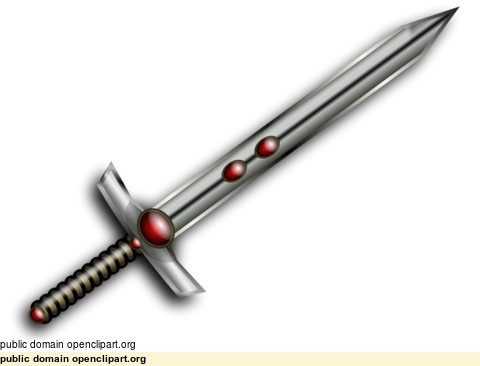
ie, it is not majoring on the major truths of God; (tragically very often as much pride as zeal for truth is in such disputes - a 2 edged sword that wounds him who holds it, and many bystanders; only great humility can wield it safely). The non-negotiable majors of the Christian faith?:- Christ is God : Without Jesus We are lost : Christ is the only saviour : He is the complete saviour : We must trust in Him alone : He rose bodily from the dead : He will come again to judge the world : He is holy and so must we be : The Bible is the complete and true Word of God.
out of Scriptural proportion
forgetting that neither am I perfect (and if I only knew myself better, very imperfect)
eg, church government, systematic theology, baptism, last things, style of worship, how we evangelise, Christian liberties; (the servant of the Lord must not quarrel, but be gentle...in humility correcting those who are in opposition - 2 Tim. 2:24,25); we should seek a settled mind on all these, but not to doubtful disputation (Ro 14:1)
"By this all will know that you are my disciples, if you have love for one another" Jn 13:35. We disgrace Christ by needless disputes and lovelessness
"that they all may be one...that the world may believe that you sent me" - they won't if we aren't.

Then I should be ready for open-hearted fellowship with that person, pray for God's blessing on them, and value them highly in love for Jesus' sake. (Ro 14:4)
(Note: there is a proper time to separate, eg, 1 Cor. 5:11, 2 Thess 3:6, 1 Tim.6:3-5) - see The Anathemas below)
Charles Simeon meets John Wesley (Calvinist & Arminian, so called).
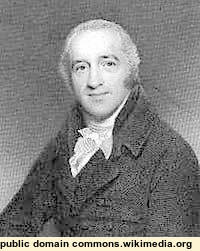
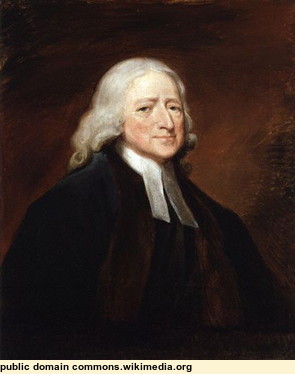
"Sir, I understand that you are called an Arminian; and I have been sometimes called a Calvinist; and therefore I suppose we are to draw daggers. But before I consent to begin the combat, with your permission I will ask you a few questions.
Pray, Sir, do you feel yourself a depraved creature, so depraved that you would never have thought of turning to God, if God had not first put it into your heart?"
"Yes, I do indeed."
"And do you utterly despair of recommending yourself to God by anything you can do; and look for salvation solely through the blood and righteousness of Christ?"
"Yes, solely through Christ."
"But, Sir, supposing you were at first saved by Christ, are you not somehow or other to save yourself afterwards by your own works?"
"No, I must be saved by Christ from first to last."
"Allowing, then, that you were first turned by the grace of God, are you not in some way or other to keep yourself by your own power?"
"No."
"What then, are you to be upheld every hour and every moment by God, as much as an infant in its mother's arms?"
"Yes, altogether."
"And is all your hope in the grace and mercy of God to preserve you unto His heavenly kingdom?"
"Yes, I have no hope but in Him."
"Then, Sir, with your leave I will put up my dagger again; for this is all my Calvinism; this is my election, my justification by faith, my final perseverance: it is in substance all that I hold, and as I hold it; and therefore, if you please, instead of searching out terms and phrases to be a ground of contention between us, we will cordially unite in those things wherein we agree."
The fact that God uses us despite our failings is to teach us:-
a healthy distrust of ourselves, and a fuller leaning on God for everything
to Him Who does not cast me off despite my many failings
even though they differ in minor areas; God can and will use them, just as He does me. (as Moses was charitable towards Eldad & Medad despite their fault). - Joshua later needed much encouragement (often, "Be strong, etc.")
(ie, on basis of His revealed truth), and to rather say as Joshua ought to have said, "Moses my lord, encourage them, to keep serving God, and to serve Him better".

("anathema", from New Testament Greek, is a word used mainly in the English language to describe vehement disagreement to something.)
By John Piper. © Desiring God. Website: desiringGod.org [from John Piper's lecture on Simeon; https://www.desiringgod.org/resource-library/biographies/brothers-we-must-not-mind-a-little-suffering ]
He did not want to be labeled a Calvinist or an Arminian. He wanted to be Biblical through and through and give every text its due proportion, whether it sounded Arminian as it stands or Calvinistic. But he was known as an evangelical Calvinist, and rightly so. As I have read portions of his sermons on texts concerning election and effectual calling and perseverance he is uninhibited in his affirmation of what we would call the doctrines of grace. In fact he uses that phrase approvingly in his sermon on Romans 9:19-24 (Horae Homileticae, Vol. 15, p. 358). But he had little sympathy for uncharitable Calvinists. In a sermon on Romans 9:16, he said,
Many there are who cannot see these truths (the doctrines of God's sovereignty), who yet are in a state truly pleasing to God; yea many, at whose feet the best of us may be glad to be found in heaven. It is a great evil, when these doctrines are made a ground of separation one from another, and when the advocates of different systems anathematize each other. In reference to truths which are involved in so much obscurity as those which relate to the sovereignty of God mutual kindness and concession are far better than vehement argumentation and uncharitable discussion (Horae Homileticae, Vol. 15, p. 357).
An example of how he lived out this counsel is seen in the way he conversed with the elderly John Wesley. He tells the story himself:
Sir, I understand that you are called an Arminian; and I have been sometimes called a Calvinist; and therefore I suppose we are to draw daggers. But before I consent to begin the combat, with your permission I will ask you a few questions.
Pray, Sir, do you feel yourself a depraved creature, so depraved that you would never have thought of turning to God, if God had not first put it into your heart?
Yes, I do indeed.
And do you utterly despair of recommending yourself to God by anything you can do; and look for salvation solely through the blood and righteousness of Christ?
Yes, solely through Christ.
But, Sir, supposing you were at first saved by Christ, are you not somehow or other to save yourself afterwards by your own works?
No, I must be saved by Christ from first to last.
Allowing, then, that you were first turned by the grace of God, are you not in some way or other to keep yourself by your own power?
No.
What then, are you to be upheld every hour and every moment by God, as much as an infant in its mother's arms?
Yes, altogether.
And is all your hope in the grace and mercy of God to preserve you unto His heavenly kingdom?
Yes, I have no hope but in Him.
Then, Sir, with your leave I will put up my dagger again; for this is all my Calvinism; this is my election, my justification by faith, my final perseverance: it is in substance all that I hold, and as I hold it; and therefore, if you please, instead of searching out terms and phrases to be a ground of contention between us, we will cordially unite in those things wherein we agree. (Moule, 79f)
But don't take this to mean that Simeon pulled any punches when expounding Biblical texts. He is very forthright in teaching what the Bible teaches and calling error by its real name. But he is jealous of not getting things out of balance.
He said that his invariable rule was "to endeavor to give to every portion of the Word of God its full and proper force, without considering what scheme it favours, or whose system it is likely to advance" (Moule, 79). "My endeavor is to bring out of Scripture what is there, and not to thrust in what I think might be there. I have a great jealousy on this head; never to speak more or less than I believe to be the mind of the Spirit in the passage I am expounding" (Moule, 77).
He makes an observation that is true enough to sting every person who has ever been tempted to adjust Scripture to fit a system.
Of this he (speaking of himself in the third person) is sure, that there is not a decided Calvinist or Arminian in the world who equally approves of the whole of Scripture who, if he had been in the company of St. Paul whilst he was writing his Epistles, would not have recommended him to alter one or other of his expressions.
But the author would not wish one of them altered; he finds as much satisfaction in one class of passages as another; and employs the one, he believes, as freely as the other. Where the inspired Writers speak in unqualified terms, he thinks himself at liberty to do the same; judging that they needed no instruction from him how to propagate the truth. He is content to sit as a learner at the feet of the holy Apostles and has no ambition to teach them how they ought to have spoken. (Moule, 79)
click here for a printable PDF of this web page
Home... Help... Search... MyGod...
This page tardus.net/GodUsesUsDespiteOurFailings.html Last refreshed: 04 Oct 2023
Contact me, "Tardus"
Copyright
 powered by txt2tags
powered by txt2tags